Reviewed by Glenn Erickson
The American Film Institute started off doing truly risky things, like granting money for Robert Kramer's Ice, a fictional group of armed revolutionaries similar to the Weather Underground. After submitting one of his student films, David Lynch made the trek to California and began the five-year process of filming an avant-garde film described in its original tag line as, "A dream of dark and troubling things."
Los Angeles in the 1970s was a haven for revival movie theaters. We had the Encore in Hollywood and the Vagabond near MacArthur Park, both of which often showed studio vault prints. The Fox Venice booked every sort of film but favored counterculture content. The Gary on Santa Monica (I think) showed 16mm prints of classics. Active on the West side was the Nuart, the only one of these theaters still in business today. It too offered an eclectic diet; I remember attending a night of ancient propaganda documentaries about the Spanish Civil War. The Nuart was into midnight movies in a big way -- I believe that Pink Flamingos had been an earlier hit. But the weirdest cult midnight show of them all came along in 1977. After premiering at FILMEX it took residence at the Nuart; I remember coming home from work in Venice late at night and seeing the long lines of patrons. The only hint of what the film was about was a murky trailer with a deafening soundtrack. People trying to explain the film's impact tended to talk like faux-hippies from years before: "Wow man, like you just have to see it for yourself."
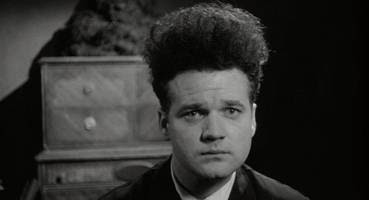
Eraserhead made David Lynch an instant "auteur". Over 35 years later it is still something special, and is perhaps the only 'cult midnight movie' to have legs as cinema art. Its imagery is as disturbingly surreal as that of Luis Buñuel's Un chien Andalou, but it has no political aims. It is more nightmarish than John Parker's Dementia, but it is not strictly a horror film. If David Lynch couldn't make movies he might have become a painter of strange imagery. Lynch's own student films look promising, but aren't that different from the (mostly terrible) student work we saw during screenings at UCLA. Eraserhead is a self-contained filmic 'experience'. It's intensely controlled yet it never seems mannered or forced. It can't be labeled as belonging to any particular genre. It plays out as original.
Lynch's story sticks with Henry Spencer (John/Jack Nance), an alienated, defeated young man who lives in a depressing industrial hell. The hungry-eyed prostitute in the room across the hall looks at him strangely; his psychologically damaged girlfriend Mary can't handle stress. Invited to dinner, Henry is confronted by Mary's mother and told that he's fathered a child with Mary. For her part, Mary is almost too traumatized to speak: "They're still not sure it is a baby." The film jumps almost directly to Mary and Henry's pathetic attempt to care for a misshapen thing that has no arms or legs. It doesn't look human, but it cries like a baby when Henry tries to leave the room. 1
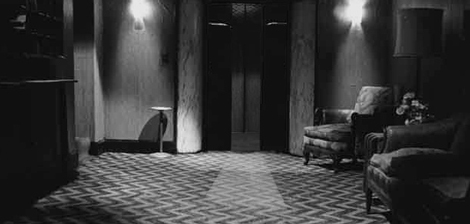
There are more 'plot' complications, but Eraserhead resolves as a series of horrid visions and psychologically oppressive situations. Poor Henry is so mentally crushed that everything he does required a painful force of will, from responding to Mary's Mother's questions to dealing with the film's unending parade of nightmarish phenomena.
If David Lynch had expressed his imagination in a non-artistic context, he might have been locked away. Critics throw the phrase "director's personal vision" around too loosely, but this artist definitely has one. Lynch's morbid associations conjure an unpleasant nightmare distortion of family life. It's a laundry list of things we'd rather not think about -- birth defects, deformities, and what goes on in the minds of people who mistreat or abuse children. Anyone raising a child has experienced dark thoughts of 'worst case scenarios', private anxieties that reflect one's shaky hold on parental responsibility, about one's fear of failure. Henry is in an impossible bind. He wants to do the right thing, but taking care of this 'thing' is hopeless. The poor little creature suffers. It cries out in alarm, it gets sick. Mary can't or won't help. We project our own guilt onto Henry and share his misery. And there's only one way out. 2
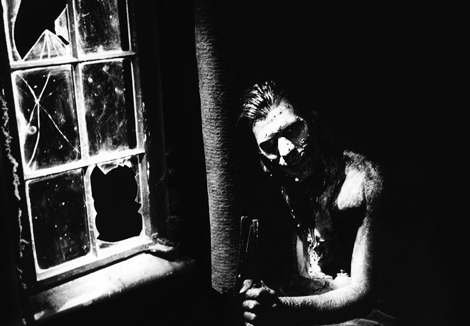
Although slow-paced to the point of distraction, Eraserhead never loses hold of our attention. We're witness to a full dose of David Lynch's personal 'visions', many of which return in different forms in his later shows. Grimy waiting rooms with zigzag-patterned carpets remind us of Twin Peaks. Vaguely organic outgrowths (?) of what looks like bird's nest twigs or crispy shredded paper crop up everywhere, like mutated vacuum cleaner dust. Inside an old radiator is a creepy stage that becomes a setting for a grotesque singing performance, an oneiric motif that returns in several Lynch films including Mulholland Drive, and by extension, to Dean Stockwell's flashlight-lit lip-synched performance of a Roy Orbison song in Blue Velvet. In yet another parallel dimension, we see a planet in space, in which a deformed man (Jack Fisk) seems to be operating some kind of cosmic machinery.
Even more disturbing are organic 'string-flesh' creatures first seen falling from space. They also appear in Mary and Henry's bed, while she experiences convulsions. These 'things' can only be more awful proto-offspring, as if Mary were disgorging a brood of horrible mutations. Lynch presents in sickening poetry what director David Cronenberg was exploring on the plane of clinical science fiction.
Lynch's space epic Dune is peppered with extrapolations of Eraserhead-like imagery -- the planets spinning in dreams as well as the larva-like giant 'Guild Navigator'. The Navigator's eyes look like those of Henry's premature offspring, and its facial flesh is similar to the grotesque cheeks of the singer in the radiator (Laurel Near). That same 'cottage-cheese' texture is also shared by Lynch's The Elephant Man, who experiences his dreams about the void of outer space.
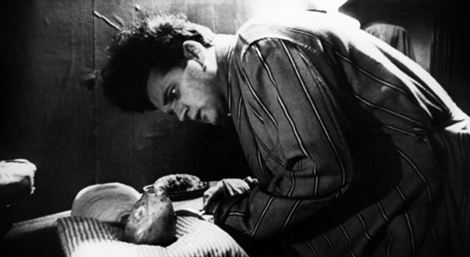
Adding to our disquiet at the various eruptions of "dark and troubling things" is the film's impressive soundtrack. Lynch and Alan Splet pioneer new audio dimensions with their use of oppressive industrial noises and 'atmospheres'. Henry lives in an environment of howling wind and the echo-y, reverberating din of factory sounds. 'White Noise' might be a relief. Yet the soundtrack is subtle and nuanced. The grinding machine noises are even used for dramatic effect, when we're anticipating something particularly horrible.
The film's lighting schemes makes every setting seem intolerable. In Henry's apartment building, floors are illuminated but the light drops off to almost nothing at shoulder height. Anything could be hidden in the shadows. Lynch's special visual effects are equally mysterious. Beyond the usual super-impositions are dreamlike visions of flowing liquids and backlit swirls of particles in the air, as with the iconic image of Henry and his demented hairstyle. Eraserhead succeeds because it adds up to more than an exhibition of shocks and outrages; David Lynch's obsessive images are arranged in patterns that connect with human emotions... even if the result is a mix of awe and revulsion.
The Criterion Collection's Blu-ray of Eraserhead is an impressive HD transfer in carefully shaded B&W. Standard def video presentations couldn't reproduce the contrast between brightly lit scenes and many that play out in dank half-shadows. The contrast range also enlivens shots of weird beauty, as when the screen is filled with swirling dots of light -- dust? Water particles? The transfer is at 1:85, which improves the image greatly over older flat presentations. Nothing is lost; compositions are pleasingly off-kilter.
The extras are organized into two groups. Six earlier Lynch short films are present in new transfers: Six Men Getting Sick, The Alphabet, The Grandmother, The Amputee and Premonitions Following an Evil Deed. All but the last have been released before, on an earlier Subversive Cinema DVD that I reviewed in 2006.
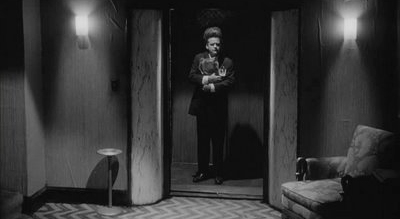
The index of other material is listed only by year, which would seem to be a David Lynch gesture. Bits of film and videotape interviews over the years see Lynch talking with Jack Nance in a moving convertible and touring the AFI mansion where Eraserhead was filmed. He discusses many filming details, often quite candidly. The entry for 2001 is a long-form documentary organized around an image of Lynch talking in a recording booth, like Lemmy Caution in Alphaville. He's remarkably open about his techniques and expresses gratitude to his collaborators.
The big revelation is that the filming of Eraserhead lasted a full five years. At least that gave the director adequate time to get it right. If Lynch wasn't peculiar before making this show he certainly was after... living and sleeping in Eraserhead- land for years. Actor Jack Nance kept his odd hairstyle for five years as well. That's art.
A new documentary rounds up the surviving cast and crew, who talk quite excitedly about their experience working with David for such a long time. When they were living and filming like vagabonds in a forgotten garden shed in Beverly Hills, Lynch promised to pay ownership points to his collaborators. He kept his word, to everyone's surprise.
No outside critical examination of the film is included, presumably as per the director's preference. Some analysis is afforded in a lengthy David Lynch interview by Chris Rodley, reprinted in the disc's 64-page insert booklet. Criterion's disc producer is Susan Arosteguy. The new disc is also available on DVD.
On a scale of Excellent, Good, Fair, and Poor,
Eraserhead Blu-ray
rates:
Movie: Excellent
Video: Excellent
Sound: Excellent (stereo)
Supplements: six earlier David Lynch short films; various video and film clips through the years; Lynch's own 2001 docu on the making of the film, new interview featurette with Lynch collaborators.
Deaf and Hearing-impaired Friendly?
YES; Subtitles: English
Packaging: Keep case
Reviewed: September 10, 2014
Footnotes:
1. The IMDB's description of how the creature in Henry's room was concocted sounds real to me... Lynch apparently dabbled in sculpting the 'baby' as well as the numerous 'string-flesh' creatures from 'organic material'. Sensibilities have changed: a well-known makeup artist tells me that it became necessary for him to study photographs of burn and accident victims, and mutilated corpses.
Return
2. Frankly, when I saw E.T. I thought immediately of Eraserhead. In both pictures an emotionally limited boy has a crippling emotional connection to a sick and perhaps dying alien creature. As 'spiritually lighthearted' as Spielberg's movie was, I felt it was an overwrought remake of Lassie Come Home. For me, the 'horrible' Eraserhead made a more honest connection.
Return

Text © Copyright 2014 Glenn Erickson
See more exclusive reviews on the Savant Main Page.
The version of this review on the Savant main site has additional images, footnotes and credits information, and may be updated and annotated with reader input and graphics.
Return to Top of Page
|


